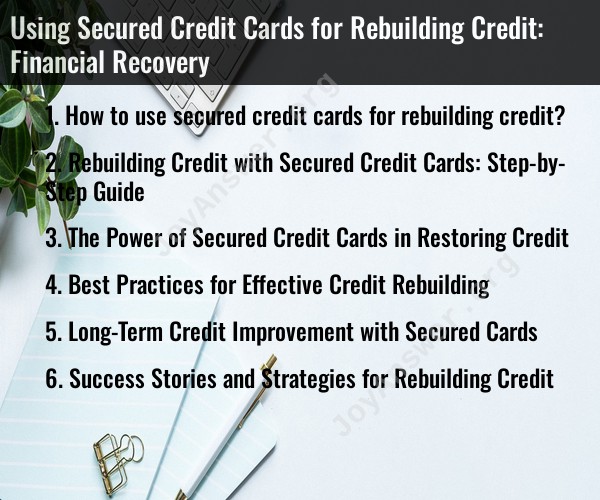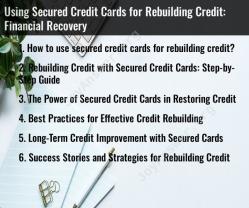How to use secured credit cards for rebuilding credit?
Secured credit cards are valuable tools for rebuilding or establishing credit, particularly if you have a limited or damaged credit history. These cards require you to make a security deposit, which serves as collateral for the credit line. Here are steps to effectively use a secured credit card for rebuilding credit:
Research and Choose a Reputable Secured Credit Card:
- Look for a secured credit card offered by a reputable financial institution. Compare fees, interest rates, and credit-building features.
Apply for the Secured Credit Card:
- Complete the application for the secured credit card and provide the required security deposit, which typically determines your credit limit.
Use the Card Responsibly:
- Treat your secured credit card like any other credit card. Use it for small, manageable purchases, and only spend what you can afford to pay off in full each month.
Make Timely Payments:
- One of the most critical factors in rebuilding credit is making on-time payments. Pay at least the minimum amount due by the due date to avoid late fees and negative credit reporting.
Keep Balances Low:
- Try to maintain a low credit utilization rate, which is the percentage of your credit limit that you use. A lower utilization rate can have a positive impact on your credit score. Aim to keep your balance below 30% of your credit limit.
Monitor Your Credit:
- Regularly check your credit reports from the three major credit bureaus (Equifax, Experian, and TransUnion) to ensure that your secured card activity is being reported accurately.
Pay in Full:
- Whenever possible, pay your balance in full each month to avoid interest charges and reduce the risk of accumulating debt.
Graduate to an Unsecured Card:
- Some secured credit cards offer the opportunity to "graduate" to an unsecured credit card after demonstrating responsible credit use over time. This means you'll get your security deposit back, and the card becomes unsecured.
Be Patient:
- Rebuilding credit takes time, and your credit score won't improve overnight. Consistently practicing responsible credit habits is the key to success.
Avoid Closing the Account:
- Once you've improved your credit and qualify for an unsecured credit card, it's often beneficial to keep your secured card open. The length of your credit history can positively impact your credit score.
Apply for Additional Credit (When Ready):
- As your credit improves, consider applying for additional credit products, such as unsecured credit cards, loans, or lines of credit. Diversifying your credit profile can further boost your credit score.
Seek Financial Guidance:
- If you're struggling with credit issues, consider seeking advice from a credit counselor or financial advisor who can help you manage your finances and credit effectively.
Remember that rebuilding credit is a gradual process, and it may take several months or even years to see significant improvements in your credit score. The key is to demonstrate responsible credit behavior, including on-time payments and responsible credit utilization. Over time, your efforts can lead to a healthier credit profile and expanded financial opportunities.
Rebuilding Credit with Secured Credit Cards: Step-by-Step Guide
Secured credit cards can be a valuable tool for rebuilding credit. They require a security deposit, which serves as your credit limit. As you use the card and make on-time payments, your credit score will improve.
Here is a step-by-step guide on how to rebuild credit with a secured credit card:
- Choose a secured credit card. Compare different cards to find one with the best terms and fees.
- Make a security deposit. The security deposit will typically be equal to your credit limit.
- Use the card responsibly. Make small purchases and pay your bill in full on time each month.
- Request a credit limit increase. After a few months of on-time payments, you may be eligible for a credit limit increase. This can help you build your credit score even faster.
The Power of Secured Credit Cards in Restoring Credit
Secured credit cards can be a powerful tool for restoring credit because they allow you to demonstrate your ability to manage credit responsibly. As you use the card and make on-time payments, your credit score will improve.
Here are some of the benefits of using a secured credit card to rebuild credit:
- No credit history required. Secured credit cards are available to people with no credit history or bad credit.
- Build your credit score. As you use the card responsibly and make on-time payments, your credit score will improve.
- Improve your credit mix. Secured credit cards are a type of revolving credit, which can help to improve your credit mix.
- Qualify for unsecured credit cards. After a period of time, you may be able to qualify for an unsecured credit card, which does not require a security deposit.
Best Practices for Effective Credit Rebuilding
Here are some best practices for effective credit rebuilding:
- Use your secured credit card responsibly. Make small purchases and pay your bill in full on time each month. This will show creditors that you are a reliable borrower.
- Keep your credit utilization low. Your credit utilization is the amount of credit you are using compared to your total available credit. It is best to keep your credit utilization below 30%.
- Avoid opening too many new accounts. Opening too many new accounts in a short period of time can damage your credit score.
- Dispute any errors on your credit report. Review your credit report regularly and dispute any errors you find.
Long-Term Credit Improvement with Secured Cards
With consistent use and responsible management, a secured credit card can help you improve your credit score significantly over time. In fact, many people who use secured credit cards to rebuild their credit are able to qualify for unsecured credit cards within a year or two.
Here are some tips for long-term credit improvement with secured cards:
- Continue to use your secured credit card responsibly. Even after you qualify for an unsecured credit card, it is important to continue to use your secured credit card responsibly. This will help you to maintain a good credit history.
- Gradually increase your credit limit. As your credit score improves, request credit limit increases from your credit card issuer. This will help you to build your credit score even faster.
- Monitor your credit score regularly. Review your credit report and credit score regularly to track your progress and to identify any areas where you need to improve.
Success Stories and Strategies for Rebuilding Credit
There are many success stories of people who have used secured credit cards to rebuild their credit. Here are a few strategies that have helped them to succeed:
- Set realistic goals. Don't expect to rebuild your credit overnight. Set realistic goals for yourself and track your progress along the way.
- Be patient and persistent. Rebuilding credit takes time and effort. Be patient and persistent in your efforts, and you will eventually reach your goals.
- Seek professional help if needed. If you are struggling to rebuild your credit on your own, consider seeking professional help from a credit counselor or financial advisor.
Conclusion
Secured credit cards can be a valuable tool for rebuilding credit. By using your secured credit card responsibly and making on-time payments, you can improve your credit score and qualify for unsecured credit cards in the future.




